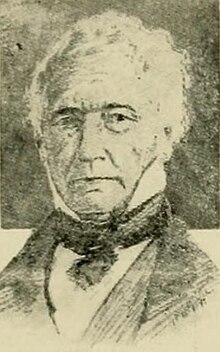| This article includes a list of general references, but it lacks sufficient corresponding inline citations. Please help to improve this article by introducing more precise citations. (February 2013) (Learn how and when to remove this message) |
| John Scott | |
|---|---|
 | |
| Member of the U.S. House of Representatives from Missouri's at-large district | |
| In office August 10, 1821 – March 3, 1827 | |
| Preceded by | Himself (Delegate) |
| Succeeded by | Edward Bates |
| Delegate to the U.S. House of Representatives from the Missouri Territory's at-large district | |
| In office August 4, 1817 – March 3, 1821 | |
| Preceded by | Himself |
| Succeeded by | Himself (Representative) |
| In office August 6, 1816 – January 13, 1817 | |
| Preceded by | Rufus Easton |
| Succeeded by | Himself |
| Personal details | |
| Born | (1782-05-18)May 18, 1782 Hanover County, Virginia, U.S. |
| Died | October 1, 1861(1861-10-01) (aged 79) Ste. Genevieve, Missouri, U.S. |
| Political party | Democratic-Republican (Before 1824) National Republican (1824–1834) |
| Relatives | Andrew Scott |
| Education | Princeton University (BA) |
John Scott (May 18, 1782 – October 1, 1861) was a Delegate and a U.S. Representative from Missouri.
Born in Hanover County, Virginia in 1782, Scott moved with his parents to Indiana Territory in 1802. He was graduated from Princeton College in 1805. He studied law. He was admitted to the bar and commenced practice in Ste. Genevieve, Missouri, in 1806. He owned slaves. He presented credentials as a Delegate-elect to the Fourteenth Congress from the Territory of Missouri and served from August 6, 1816 to January 13, 1817, when the election was declared illegal and the seat vacant.
Scott was elected as a Delegate to the Fifteenth and Sixteenth Congresses and served from August 4, 1817, to March 3, 1821. Upon the admission of Missouri as a State into the Union, Scott was elected as a Democratic-Republican to the Seventeenth Congress, reelected as an Adams-Clay Republican to the Eighteenth Congress, and elected as an Adams candidate to the Nineteenth Congress and served from August 10, 1821, to March 3, 1827. He served as chairman of the Committee on Public Lands (Nineteenth Congress). He was an unsuccessful candidate for reelection in 1826 to the Twentieth Congress. He resumed the practice of law. He died in Ste. Genevieve on October 1, 1861.
Personal life
Scott had a son, Andre J. Scott who went to the California gold fields. His son was made the treasurer for the company of gold miners he fell in with. One of the men, Chas. Orr Baker of Boston, MA asked him to account for a $9 accounting discrepancy. In a fit of alcohol fueled temper, Andre stabbed the man. His fellow miners found him guilty of murder and hanged near Placerville, California April 3, 1851. Andre requested to be shot to spare his father's feelings because of his position in society, but was denied after a vote.
Scott's younger brother, Andrew Scott, also had a proclivity for violence. While serving as a judge in the Arkansas Territory, he is known to have dueled with and killed two men. He was never found guilty of murder.
References
- Lives of Eminent Missourians
- "Congress slaveowners", The Washington Post, January 19, 2022, retrieved July 10, 2022
- Hutchings, James Mason (1980). Seeking the Elephant, 1849. The Arthur H. Clark Company.
- The Original City of Litle Rock (PDF). Pulaski County Historical Society. 2016. p. 11. Retrieved January 13, 2025.
- United States Congress. "John Scott (id: S000176)". Biographical Directory of the United States Congress.
| U.S. House of Representatives | ||
|---|---|---|
| Preceded byRufus Easton | Delegate to the U.S. House of Representatives from the Missouri Territory's at-large congressional district 1816–1817 |
VacantTitle next held byHimself |
| VacantTitle last held byHimself | Delegate to the U.S. House of Representatives from the Missouri Territory's at-large congressional district 1817–1821 |
Succeeded byHimselfas U.S. Representative |
| Preceded byHimselfas U.S. Delegate | Member of the U.S. House of Representatives from Missouri's at-large congressional district 1821–1827 |
Succeeded byEdward Bates |
| Preceded byChristopher Rankin | Chair of the House Public Lands Committee 1826–1827 |
Succeeded byJacob C. Isacks |
- 1782 births
- 1861 deaths
- People from Hanover County, Virginia
- Delegates to the United States House of Representatives from Missouri Territory
- Democratic-Republican Party members of the United States House of Representatives from Missouri
- National Republican Party members of the United States House of Representatives from Missouri
- Members of the United States House of Representatives removed by contest
- Missouri lawyers
- Princeton University alumni
- Members of the United States House of Representatives who owned slaves
- 19th-century American lawyers
- 19th-century members of the United States House of Representatives
